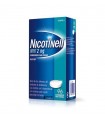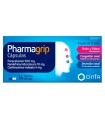This medicine contains aspirin and caffeine as active substances. Acetylsalyclic acid works by reducing pain and fever, and caffeine, has a stimulating action of the nervous system.
Aspirin Plus is indicated in adults and children over the age of 16 for symptomatic relief from mild or moderate occasional pains, such as headaches, dental, menstrual, muscle (contractures) or back (lumbalgia).
1. What is Aspirin Plus and what is it used for
This medicine contains acetylsalicylic acid and caffeine as active ingredients. Acid
Acetylsalicylic acts by reducing pain and fever, and caffeine has a stimulating action of the
nervous system.
Aspirin Plus is indicated in adults and children over 16 years of age for the symptomatic relief of
occasional mild or moderate pain, such as headaches, dental, menstrual, muscle pain
(contractures) or back (low back pain). Febrile states.
2. Before taking Aspirin Plus
Do not take Aspirin Plus if:
- you are allergic (hypersensitive) or have had an allergic reaction to acetylsalicylic acid,
caffeine or any other component of this medicine,
- suffer from stomach or intestinal ulcers or recurrent gastric discomfort.
- have had allergic reactions of the asthmatic type (difficulty breathing, choking, bronchospasm and
in some cases coughing or wheezing when breathing) when taking anti-inflammatories, acetylsalicylic acid, others
pain relievers, as well as the dye tartrazine,
- have or have suffered from asthma,
- suffer from nasal polyps associated with asthma that are caused or increased by acid
acetylsalicylic,
- suffer from haemophilia or other blood clotting problems,
- you are being treated with oral anticoagulant medicines,
- suffer from kidney and / or liver diseases (kidney and / or liver failure),
- suffer from heart disease,
- have severe hypertension,
- you are under 16 years of age, since the use of acetylsalicylic acid has been linked to the Syndrome of
Reye, rare but serious illness,
- you are in your third trimester of pregnancy.
Take special care with Aspirin Plus:
You should consult your doctor in case you require this medicine
? if you have high blood pressure, or have reduced kidney, heart or liver functions, or
have alterations in blood clotting,
? if you are taking anticoagulants,
? if you are taking anti-inflammatories or other types of medicines since certain medicines
can interact with Aspirin Plus and produce undesirable effects (see section “Use of
other medications ”),
? if you have had a stomach or intestinal ulcer,
? if you have a deficiency of glucose-6-phosphate shidrogenase,
? if you suffer or have suffered from rhinitis or urticaria,
? if you have recently undergone or if you need to undergo an intervention within the next 7 days
surgical, including dental surgery,
? if you are in the first or second trimester of pregnancy,
? not administer systematically to prevent possible discomfort caused by
vaccinations,
? if you have a cardiac arrhythmia, have increased thyroid function or have a syndrome
anxious, take this medicine with caution and always at low doses (maximum 2 tablets
a day) or consult your doctor,
? if you have recently had a heart attack, do not take this medicine until
that several weeks have passed since the accident,
? if you have suffered from heart diseases or disorders (cardiac arrhythmia, myocardial ischemia,
angina pectoris…),
? if you are diabetic keep in mind that caffeine can alter sugar levels in
blood,
? if you are allergic to xanthines (amino filine, theophylline….) you should not take this
medication, as you could also be allergic to caffeine.
It is recommended to limit the use of products containing caffeine when being treated with
this medicine.
In people with sleeping difficulties, it is recommended not to take this medicine in the hours
before going to bed, to avoid possible insomnia.
Use of other medications:
Please inform your doctor or pharmacist if you are using or have recently used any other medicines.
even those purchased without a prescription, homeopathic, medicinal plants and other health-related products as it may be necessary to interrupt treatment or adjust the dose to any of them.
This is especially important in the case of:
- other analgesics or non-steroidal anti-inflammatory drugs (medicines used to treat pain
and / or muscle inflammation),
- some antidepressants, such as selective serotonin reuptake inhibitors, since
increases the risk of bleeding,
- anticoagulants (medicines used to “thin” the blood and prevent the appearance of
clots) such as warfarin,
- oral contraceptives,
- oral antidiabetics (medicines to lower blood sugar),
- antihistamines (used to reduce the symptoms of allergic reactions),
- quinolone or erythromycin anti-infectives (antibiotics to treat infections),
- barbiturates (medicines used to treat seizures),
- beta-blockers (medicines for hypertension control ),
- bronchodilators (medicines to treat bronchial asthma),
- cimetidine and ranitidine (used for heartburn and stomach ulcer),
- medicines used to prevent rejection of transplants (cyclosporine and tacrolimus),
- corticosteroids, as they can increase the risk of gastrointestinal bleeding,
- digoxin (heart medicine),
- disulfiram (used in the recovery treatment of alcoholic patients),
- high blood pressure (diuretics and ACE inhibitors),
- phenytoin and valproic acid (used to treat epilepsy),
- iron (for the treatment of anemia), it is recommended to distance it at least 2 hours,
- interferon alfa (used to treat certain viral and tumor infections),
- lithium (used in some psychiatric illness),
cancer or rheumatoid arthritis (methotrexate)
- mexiletine (used to correct heart rhythm disturbances such as cardiac arrhythmias),
- medicines used to treat gout (probenecid),
- sympathomimetics (used to increase blood pressure),
- thyroxine (used to treat diseases caused by thyroid deficiencies),
- vancomycin (antibiotic used for infections),
- zidovudine (used to treat patients infected with the virus
human immunodeficiency, causing AIDS).
Interference with diagnostic tests:
If you are going to have any diagnostic tests (including blood, urine, etc…), inform your
doctor who is taking this medicine as it may alter the results.
Taking Aspirin Plus with food and drink:
Take this medicine after meals or with food.
If you habitually consume alcohol (three or more alcoholic drinks-beer, wine, liquor,… - at
day), taking Aspirin Plus may cause stomach bleeding.
Limit consumption of beverages that contain caffeine (coffee, tea, chocolate, and cola drinks), while
are taking this medicine.
Pregnancy
Consult your doctor or pharmacist before taking any medicine.
IMPORTANT FOR WOMEN:
If you are pregnant or think you might be, consult your doctor before taking this
medicine. Consumption of this medicine during the first and second trimesters of pregnancy
it can be dangerous for the embryo or fetus and should be monitored by your doctor . Don't take this
medication during the third trimester of pregnancy , as it may prolong labor and contribute
bleeding from the mother or baby.
Lactation
Consult your doctor or pharmacist before taking any medicine.
Breast-feeding women should consult a doctor before using this medicine, as
acetylsalicylic acid and caffeine pass into breast milk. Although caffeine passes into breast milk in
small amounts (about 1%), it can accumulate in the infant.
Driving and using machines:
No effect on the ability to drive or use machines has been reported.
3. How to take Aspirin Plus
Follow these instructions unless your doctor has given you different directions.
Ask your doctor or pharmacist if you have doubts.
The normal dose is:
Adults and over 16 years : 1 tablet every 4 or 6 hours, if necessary. It will not exceed 8
tablets in 24 hours.
Patients with reduced liver or kidney functions : consult a doctor as the dose must be reduced.
Use in children:
Do not administer to children under 16 years of age.
Use in over 65s
Elderly people should not take this medicine without consulting their doctor, as
they are more likely to suffer from its adverse effects.
Form of administration:
This medicine is administered orally.
It is recommended to take the tablets with plenty of fluids (water or milk). The tablets should
torment with meals or food, especially if digestive discomfort is noted. This medicine should not be taken on an empty stomach. Always use the lowest dose that is effective.
The administration of this preparation is subject to the appearance of painful or feverish symptoms. TO
as these disappear, this medication should be discontinued.
If the pain persists for more than 5 days, the fever for more than 3 days or the symptoms worsen or other different ones appear, you should stop the treatment and consult a doctor.
If you take more Aspirin Plus than you should:
If you have taken more Aspirin Plus than you should, consult your doctor or pharmacist immediately.
The main symptoms of acetylsalicylic acid overdose are: headache, dizziness, ringing in the ears, blurred vision, drowsiness, sweating, rapid breathing, mental confusion, nausea, vomiting, and occasionally diarrhea.
Caffeine overdose symptoms are characterized by a first phase of arousal, followed by
dizziness, insomnia, vomiting, diarrhea, abdominal pain and seizures. Treatment of overdose is
most effective if done within the first 4 hours of ingestion of this medicine.
It will be recommended to bring the package and the package leaflet to the healthcare professional.
In case of overdose or accidental ingestion, immediately consult your doctor or pharmacist or go to a medical center immediately or call the Toxicology Information Service, telephone: 91 562 04 20, indicating the medicine and the amount ingested.
If you forget to take Aspirin Plus:
Do not take a double dose to make up for a forgotten dose.
If you have any questions on the use of this medicine, ask your doctor or pharmacist.
4. Possible side effects
Like all medicines, Aspirin Plus can have side effects, although not all
people suffer them.
Common side effects (seen between 1 and 10 in 100 people):
? Gastrointestinal disorders, such as stomach ulcer, intestinal ulcer, gastrointestinal bleeding,
abdominal pain, heavy digestion, burning, heartburn, gastric discomfort, nausea and vomiting.
? Respiratory disorders, such as shortness of breath (asthma, bronchial spasm), nasal congestion and
r initis.
? Urticaria, skin rashes, angioedema (inflammation and swelling affecting the face, lips, mouth,
tongue or throat, which may cause difficulty swallowing or breathing) and itching.
? Hypoprothrombinemia (impaired coagulation) when given in high doses.
Uncommon side effects (seen in between 1 and 100 in 1,000 people):
? Reye's syndrome in children under 16 years of age with febrile processes, flu or chickenpox (see section “Before
taking Aspirin Plus ”).
? Liver disorder, especially in patients with juvenile arthritis.
? Anemia.
With prolonged doses of acetylsalicylic acid, the following side effects have been observed whose
frequently it failed to pinpoint dizziness, ringing in the heard two deafness, sweating,
headache, confusion, kidney failure and acute interstitial nephritis (inflammation at the level of the
kidney).
If you notice the appearance of:
? Stomach upset or pain, gastric or intestinal bleeding, or black stools .
? Skin disorders, such as rashes or redness.
? Difficulty breathing.
? Unforeseen change in the amount or appearance of urine.
? Swelling of the face, feet, or legs.
? Deafness, ringing in the ears, or dizziness.
stop taking the medicine and consult your doctor immediately as they may indicate the
appearance of side effects that need urgent medical attention.
Due to the presence of caffeine in this medicine, the following side effects may appear
for which the exact frequency could not be established: insomnia, restlessness and nervousness and
headache. Nausea, vomiting and stomach irritation have also been observed. In some case
hyperglycaemia or hypoglycaemia (increased or decreased glucose in
blood).
Treatment should be suspended immediately, in the case in which the patient experiences any
episode of dizziness or palpitations.
High doses of caffeine can cause palpitations, rapid heartbeat, and increased blood pressure.
Communication of adverse effects
If you experience any kind of side effect, consult your doctor or pharmacist, even if
deals with possible side effects not listed in this leaflet. You can also communicate them
directly through the Spanish Pharmacovigilance System for Medicines for Human Use:
https://notificaram.es. By reporting side effects you can contribute to
provide more information on the safety of this medicine.
5. How to store Aspirin Plus
.
Keep out of the reach and sight of children.
Do not store above 30ºC.
Expiration
Do not use Aspirin Plus after the expiry date which is stated on the carton, after the abbreviation.
CAD. The expiration date is the last day of the month indicated.
Medicines must not be disposed of via wastewater or household waste. Deposit the containers and
medicines that you do not need at the Sigre Point of the pharmacy. If in doubt ask your
pharmacist how to dispose of unused medicine and containers. Thus,
will help protect the environment.
6. Additional information
Composition of Aspirin Plus:
Each tablet contains:
- As active principles: Acetylsalicylic acid, 500 mg, and Caffeine, 50 mg.
- The other ingredients (excipients) are: corn starch and powdered cellulose.
What the product looks like and contents of the pack
This medicine are round, white tablets. It comes in containers that contain
20 tablets.
Marketing authorization holder Responsible for manufacturing
Bayer Hispania, SL Bayer Bitterfeld GmbH
Av. Baix Llobregat, 3-5 OT Greppin
08970 Sant Joan Despí (Barcelona) Salegaster Chaussee, 1
06803 Bitterfeld-Wolfen (Germany)
This leaflet was approved in October 2013
Detailed and updated information on this drug is available on the website of the
Spanish Agency for Medicines and Health Products (AEMPS) http://www.aemps.gob.es/


































